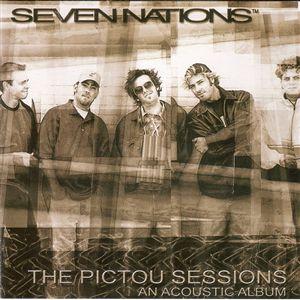 Some months back, I raved about Seven Nations’ 1999 release, The Factory. Now I’m back with a pair of releases from one of the best Celtic rock bands out there. The Pictou Sessions, released in 2000 on their own label, is what happens when a talented group of musicians travels to the town of Pictou, Nova Scotia, Canada, to endure a hectic five-day period, producing an acoustic album, “aided and abetted by several of their friends, who also happen to be some of the finest pickers and players from the region.” The second album, simply called Seven Nations, contains many of the same songs as The Pictou Sessions, a compilation of most of their crowd-pleasing hits, and was released in October, 2000, by Q Records in association with Atlantic Records. And although the two have almost the same cover, it’s important not to confuse them.
Some months back, I raved about Seven Nations’ 1999 release, The Factory. Now I’m back with a pair of releases from one of the best Celtic rock bands out there. The Pictou Sessions, released in 2000 on their own label, is what happens when a talented group of musicians travels to the town of Pictou, Nova Scotia, Canada, to endure a hectic five-day period, producing an acoustic album, “aided and abetted by several of their friends, who also happen to be some of the finest pickers and players from the region.” The second album, simply called Seven Nations, contains many of the same songs as The Pictou Sessions, a compilation of most of their crowd-pleasing hits, and was released in October, 2000, by Q Records in association with Atlantic Records. And although the two have almost the same cover, it’s important not to confuse them.
As before, Seven Nations consists of Kirk LcLeod (vocals, twelve-string acoustic guitar, piano), Struby (fretless bass, vocals), Ashton Geoghagan (drums, vocals), Scott Long (highland bagpipes, electric bagpipes, vocals), and Dan Stacey (fiddle, vocals). For The Pictou Sessions, they were joined by guest musicians Dave MacIsaac (acoustic guitar, mandolin), Dave Gunning (guitar, background vocals), Randy MacDonald (bodhran, jembe, tambourine, shakers, vocals), and Nigel Poirier (piano, vocals).
There’s a reason that Seven Nations has fast become so popular, with seven independent albums under their belt and a nation wide fan following. It’s not just the fact that they spend over 2/3rds of the year touring and playing. It’s because they’ve thrown rock, pop, traditional Celtic and more into a blender and hit “puree” to create something wholly unique. I cheered them for their FHL (Faster, Harder, Louder) factor last time, and they haven’t let down one bit since. Their lyrics are powerful, the vocals strong, the instruments energetic. They’re the musical equivalent of a force of nature, slamming into a song with all guns blazing, and leaving the listener reeling as quickly as they came. But then they’ll switch tactics from toe-tapping fiddling (such as “The Surprise Ceilidh Band Set”, as strong a tune as any I’ve heard) to the sombre and reflective (such as “God”, which is deceptively quiet, lulling one almost into a state of melancholy.)
Vocal, versatile, and unpredictable, Seven Nations is a hard act to match. They’re even harder to describe, being as multifaceted as they are talented. I’ve mentioned how they can switch styles like some people change clothes. Well, it’s true. From celebratory to inflammatory to melancholy to pure piano (of note, “Skyezinha/The Egret” on The Pictou Sessions), they’ve got something for every listener and every season. They can make bagpipes do things I swear bagpipes weren’t meant to do (the true purpose of the bagpipes being to shatter the moral of the listener, I’m told…). They’ve got good old drinking songs, like “A Rare Auld Time,” and pipe songs (“Pipe Set”), and songs that defy definition.
So, what am I saying? I’m saying that Seven Nations is as good as ever, if not better, and if you like Celtic of any sort, you owe it to yourself to pick up The Pictou Sessions and/or Seven Nations.
They have a Web site that contains all the 7N information you could ever want. From a band history and timeline to a discography, from news articles and releases to photos, sound clips, tour dates and a chat forum, there’s even online ordering for Seven Nations music, hats, artwork and other merchandise. So, become a citizen of the Seven Nations today.
